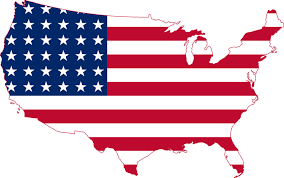
13 cultural features of Americans
I have already mentioned some of these cultural features in other articles: “Words, concepts and attitudes” and “Why I make the informedchoice to live in the US“. These 13 features sum up, in my opinion, some of the most important cultural characteristics of Americans.
- Attitude toward children: between adoration and hyper demand
Americans love children. I have already written about this in many articles. They always have a nice word for them (especially for the younger ones) and get low at their level (literally and figuratively). “Child friendly” makes totally sense in the United States.
Yet there is also a high demand for children. It took me some time to identify it, but it can show up in different circumstances: it’s as if adults have an ideal image of the world of children and they don’t want to make a dent in it. A (too) agitated child is hardly tolerated (the example of that Canadian cartoon called “Caillou” I have already written about is quite convincing and I still read here and there about parents who hate this character and fear that this “little brat” bring their young children to act like him if they look at that cartoon). During recess (when there is recess at school) or in the playground, it is strictly forbidden and parents and teachers frown about children who bicker, heckle, etc. It sounds like, in France, we consider the child as a real little but “imperfect” person to be educated and to learn “good manners”, whereas in the US, the child is supposed to already carry the “perfection” in himself, so disappointment is harder to tolerate…
It’s also interesting to have a look on children’s books. In the USA I usually see books for children (especially for the smallest ones) filled with nice stories and good feelings. Whereas in France you can find easily books with sweet-sour stories, where the end is more mitigated, and where the child can be an imperfect being.
For example, I recently bought a book for my 3-year-old daughter with the promising title “giving is giving” (a French saying) in a collection of stories where the main characters are a small rabbit and his family. My children already have several books out of this collection which show some imperfections and mixed feelings of children in a sweet way, and generally end up well and are very suitable for early readings. But when we read the story at home, I was surprised to see it finishes on the evocation of a nose stuck pasted in the car exchanged between the 2 buddies! Yuk! My daughter, this frail and adorable little girl loved it, as she currently loves to hear or repeat “poopoo, windie” and laughs out loud! I know from experience that in a few weeks or months this will end up, and with my husband we adopt a mimic meant to show her that we don’t affectionate these words without making her feel guilty. I am pretty sure that it would be hard to find such books in the United States (I have never seen any in bookstores or libraries).
- Lack of judgment and less pressure
In the US you have the freedom to have the appearance you want, do pretty much what you want, when you want and basically nobody cares! It is at the beginning a little destabilizing! You are less “hold” in social norms.
For French people who live in the US this is either attractive or a source of mockery. Many times, I have read or heard my fellow compatriots mock women wearing work suits commute in public transportation or walk on the street in sneakers or other comfortable shoes, not tuned to their outfit (they prefer comfort and they change their shoes in front of their office building). Some also mention moms who drop their children in school dressed in jogging, or even go shopping dressed in their coat of which exceeds their pajamas … For sure in France it would be inconceivable.
- To love parting and celebrating
In the United States people like to party and a party chases the other! It goes fast and it is sometimes unsettling. There are many festivals and celebrations year round: Valentine’s Day (to celebrate love AND friendship, widely celebrated by everyone and not only by lovers), Black History Month (throughout February), St. Patrick’s Day Easter, Mother’s Day, Memorial Day, Father’s Day, Independance Day, Labor Day, Halloween, Veterans Day, Thanksgiving, Christmas and New Year and other national and community celebrations (Hanukkah, Ramadan, Chinese New Year, Norouz or Spring Equinox, etc.). I remember, for example, that on the radio we had Christmas songs on the day after Thanksgiving (and there is an impressive amount of it) but on December 25, nothing! It was over.
In France, most (but not all) of these holidays also exist. But many of them are not really celebrated. They are typically days off but except for some of them that’s it, while in the US the mood is festive. And almost everything is a pretext for parting and celebrating.
You can notice this festive mood typically at school: the 101st day of school (in first grade), the festivities of the last week of school (students and teachers dress up on a different theme every day), Pi Day, Columbus Day (commemoration of the “discovery” of the American continent by Christopher Columbus, more controversial and sometimes also the opportunity to celebrate Native Americans), April Fool’s Day, Library Week etc.
- Good mood and kindness
American good mood and kindness are contagious. Of course Americans too have ups and downs, but they have as an interesting motto “fake it until you make it!” No doubt it’s not enough to feel good but at least people are less “grumpy” than in France for example.
- Gratitude
I have already pointed out in other articles the importance of “gratitude” in the United States. I am always so surprised to read about it in articles on the most unexpected subjects. Americans are typically more believers and less dependent on the State than French people, and think more about giving back a part of what they have received … In France this term has a religious meaning or implies a debt toward somebody but not there (at least it’s more cultural than religious). And I believe it contributes a lot to their well-being because remembering the positive aspects of one’s life puts in a good mood!
- To give and generosity
Donations and generosity are part of the daily life of Americans. Donations are often asked for and everyone gets in it. As a result, society is less harsh than French people imagine, because precisely the shortcomings of the State (as expected by French) are partly fulfilled by the support and generosity of everyone.
- To have fun
Do Americans look more for pleasure and fun in their lives than French? Perhaps (I even would say for sure). And they talk about it much more than French. When you talk to somebody about an activity or an outing you’re about to, people (your girlfriend as well as the salesman in the store) tell you “have fun!” I remember, for example (one example among many others) of this parking lot manager near a children’s museum who when I paid asked me: “how was your day today? Did you have fun? “And ended by “have a good rest of the day”!!! No doubt it would never happen in a parking lot in France.
- To work hard
This is a very important concept and I would say the counterpart of the previous one: “work hard play hard” … I heard countless times “X is hardworking” as French would say, “he is a good guy”! While in France the myth of genius persists, you know, the guy who realizes things effortlessly, “with elegance” … in the US people are culturally encouraged to work hard. This fascination for the effortless realization is I believe quite specific to France. Working hard is often synonymous with being a little dumb, not very smart … Other cultures that I know don’t promote the “genius” neither and its corollary, the lack of work. Nor in the USA.
- Community, share, care
In the United States it is quite easy to be part of one or more “communities” (or circles of people with common interests). French people have usually a wrong point of view about Americans considered as individualistic, because whereas the system (of employment, healthcare, etc.) is individualistic, the people aren’t.
There are words that go along with this concept: “share” is one of them. Americans say “thank you for sharing this with me / us” whereas French say “it’s interesting”! Americans are on the intimate and feelings register while French people remain impersonal and more intellectual (is it an inheritance of the French philosopher Descartes?!). An American would say “do you have a question for me, can you do this for me?” whereas a French would say “do you have any question? Can you do this? “.
“Care” is another important word / concept. I remember that a few years ago one French political party had launched “care” as a campaign slogan. It was supposed to be innovative, playing on the double meaning of care: 1) care (referring to French universal healthcare) and 2) caring for others. In the US care is much more common and daily!
- To make Money, to do business
To say that Americans are comfortable with business is a triviality. A few days after our inventory our home owner stopped by our house for papers. We just came back from grocery shopping and he saw that we had gone to a certain store brand. He gave us this piece of advice “go to Walmart, everything is so much cheaper there and especially in that great supermarket in Cockeysville. We go there once every 2 weeks and I save a lot of money “. And in spite of that (or perhaps thanks to that), he has a very nice house that must be worth a million dollars … Whenever I hear about “saving money” it makes me smile as if money was an individual.
I once met a doctor in Baltimore who had spent several months back to his home country. He told me that he made the journey “of course to earn money but also to serve and help my country of origin”. This unabashed relationship with money makes it very easy in the US to talk about money, whether it is for fundraising or to ask for a discount without offending anyone, on the contrary of France.
- To be supportive
There is no exact equivalent for this word in French. “Be supportive” means support, but the unconditional support, the one you’re supposed to show to your friends and family. You are expected to be “supportive” and Americans give their unconditional support to their relatives more broadly than French people do.
- To be in the “excitement”
This is to be linked with “have fun”. But I think it is also linked to the ability of Americans to live in extremes. Coffee, tea or soup are “hot” (not warm as in France), water or the temperature set on the A/C are “cold” (it means really frozen) and individuals aren’t fine, not even happy, they are “excited”. Some French settled in the United States use this while speaking in French, some sort of Anglicism (“I’m excited” or “super excited”) but in fact it sounds almost sexual in French!
- To comply
Whether in civil services or at school or in hospital (in fact in front of any authority) Americans are “compliant”. Even at work there is a much greater respect for the leader than in France. Not that French are head-burned and contradict incessantly and openly, but they like to show that they don’t submit immediately and totally. In the US, none of this. You are expected to be “compliant” and if the foreigner who isn’t familiar to this concept isn’t complaint, he can really get in trouble!




